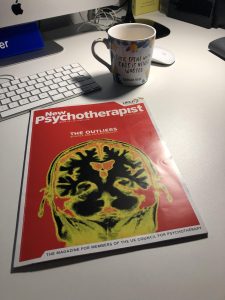 I have a lifetime love of science. As a child I would spend hours outside on cold winter nights, my telescope pointed to the moon or Orion’s belt. An archetypal ‘little professor’! This love affair continued through my first career, but I underwent some kind of rebellion. As my career shifted and I explored other aspects of my ‘self’, I turned my back on positivism, all things empirical and quantitative. The choice to train as a Humanistic therapist, its approach being based on philosophy, illustrates this; and my practice as a Buddhist definitely has me situated in an experiential ‘camp’ these days.
I have a lifetime love of science. As a child I would spend hours outside on cold winter nights, my telescope pointed to the moon or Orion’s belt. An archetypal ‘little professor’! This love affair continued through my first career, but I underwent some kind of rebellion. As my career shifted and I explored other aspects of my ‘self’, I turned my back on positivism, all things empirical and quantitative. The choice to train as a Humanistic therapist, its approach being based on philosophy, illustrates this; and my practice as a Buddhist definitely has me situated in an experiential ‘camp’ these days.
And yet – as the saying goes – you can take the woman out of science, but can you take science out of the woman? I remain a curious little professor – indeed, this blog reflects the passion I have for mastery: writing with no other intention than to explore my ideas, chew them over – its a bonus that I can share them with others (whom I hope get some benefit from my adventures). And recently, a little more of the ‘popular science’ genre has sneaked into my reading; and before I know it, I have been getting immersed in the neuroscience literature and re-visiting my old stomping ground of scholarly journals and publication search engines!
I blame (I mean attribute) my wife. A research scientist herself, she is investigating the nature of long covid and experiences of fatigue. The deeper her explorations have gone, the more curiosity roused in me given my own diagnosis of Chronic Fatigue and the work I do with clients who also experience psychosomatic conditions. Many of our dinner conversations have bandied around terms such as interoception, predictive coding, and ‘controlled hallucinations’; and with that authors such as Anil Seth, Annaka Harris, and David Chalmers have entered my life.
On our training courses, we encourage students to ‘follow the smoke’ of their interests; and right now, that is what I am doing. And yet, this brings me to an edge, a dilemma. As a Humanistic psychotherapist, particularly one whose world view is rooted in the Buddhist dharma, how do I reconcile the top down (theoretical) and bottom up (experiential)? I would go further: as a practitioner deeply committed to living a feminist life: how to balance the Western academic (masculine) with the Eastern wisdom (feminine) traditions? The edge I reach is something of a ‘hard problem’: integrating the art and science of psychotherapeutic practice.
I take this reflection seriously because I am committed to staying informed and delivering the best in practice I can – for clients, for trainees. Take for instance neuroscience – its presence in psychotherapy cannot be ignored. I do believe Polyvagal theory, EMDR (Eye Movement Desensitization and Reprocessing) and the like have value, especially in working with trauma. I would argue that the science behind psychedelics and meditation are of value to psychotherapists to understand too. But like we currently ask our MSc psychotherapy students to consider with regard to CBT, any attempt at integration must not contradict the ontological and epistemological underpinning of our chosen therapeutic approach.
 All of these considerations have been bubbling away for a few months, accompanying me as I finish my book. The pan boiled over – enough for me to share on this blog – as I was reading the Autumn edition of the “New Psychotherapist” (the magazine of the UK Council for Psychotherapy), one that focused on science and psychotherapy. What struck me was the dualistic ‘edge’ that we must help trainees navigate: and as a Humanistic, Buddhism-informed therapist, one domain that feels very important to me is really understand what we mean by ‘brain’ (the domain of neuroscience) and ‘mind’ (the domain of psychotherapy). I see a danger in the conflation of the two.
All of these considerations have been bubbling away for a few months, accompanying me as I finish my book. The pan boiled over – enough for me to share on this blog – as I was reading the Autumn edition of the “New Psychotherapist” (the magazine of the UK Council for Psychotherapy), one that focused on science and psychotherapy. What struck me was the dualistic ‘edge’ that we must help trainees navigate: and as a Humanistic, Buddhism-informed therapist, one domain that feels very important to me is really understand what we mean by ‘brain’ (the domain of neuroscience) and ‘mind’ (the domain of psychotherapy). I see a danger in the conflation of the two.
This is part of the ‘hard problem’ for psychotherapists: to navigate the inputs from science, philosophy, the theories of their chosen therapeutic approach, and their own life experiences. To quote Frances Vaughan, humanistic and transpersonal psychotherapist and author, optimum health at both an individual and collective level requires attention to all aspects of physical, emotional, mental, existential, and spiritual well-being; and thus our approach must be tailored to meet the domains of well-being that we wish to work within.
The REAL ‘hard problem’ of course concerns consciousness, and how the subjective experience of ‘being you’ comes to be. Science is searching for an empirical explanation for phenomenal experience. I’d like to return to this in next week’s blog, because I think its both a useful and necessary problem to chew over in the work with ‘psyche’.

